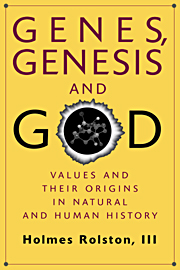Book contents
- Frontmatter
- Contents
- Preface
- Chapter 1 Genetic Values: Diversity and Complexity in Natural History
- Chapter 2 Genetic Identity: Conserved and Integrated Values
- Chapter 3 Culture: Genes and the Genesis of Human Culture
- Chapter 4 Science: Naturalized, Socialized, Evaluated
- Chapter 5 Ethics: Naturalized, Socialized, Evaluated
- Chapter 6 Religion: Naturalized, Socialized, Evaluated
- References
- Index
Chapter 6 - Religion: Naturalized, Socialized, Evaluated
Published online by Cambridge University Press: 05 June 2012
- Frontmatter
- Contents
- Preface
- Chapter 1 Genetic Values: Diversity and Complexity in Natural History
- Chapter 2 Genetic Identity: Conserved and Integrated Values
- Chapter 3 Culture: Genes and the Genesis of Human Culture
- Chapter 4 Science: Naturalized, Socialized, Evaluated
- Chapter 5 Ethics: Naturalized, Socialized, Evaluated
- Chapter 6 Religion: Naturalized, Socialized, Evaluated
- References
- Index
Summary
Since there isn't any religion in nature, it may be difficult to naturalize it, even harder than with ethics, where there is animal reciprocal cooperation as a precursor. Religion is without antecedents in wild nature. Still, the capacity in persons to be religious somehow evolved within, or emerged out of, natural systems, where before there was no such capacity. Religion too, like ethics and science, is eminent in the human genius. Human societies, historically, always produce religion. Again, there must be some story to tell – this time of the genesis of religion. Now too, however, one must assess such accounts of the genesis of religion as these are set alongside religious accounts of the genesis of nature and culture, analogously to the way one needs an account of the genesis, in culture, of science, set alongside science's account of such genesis of nature and culture.
One should be wary. The question is of the logic as well as of the origin of religion. Religion today may be something quite different from what earlier religion and its precursors initially were. The monotheism widespread in the West, which has interacted with science for several centuries, is quite different from aboriginal animisms. The many religions may not have common origins or any common logic; their origins and operations may differ. Most of what the earliest humans thought is lost in the mists of the past; any psychoprehistory is speculative.
- Type
- Chapter
- Information
- Genes, Genesis, and GodValues and their Origins in Natural and Human History, pp. 292 - 370Publisher: Cambridge University PressPrint publication year: 1999



